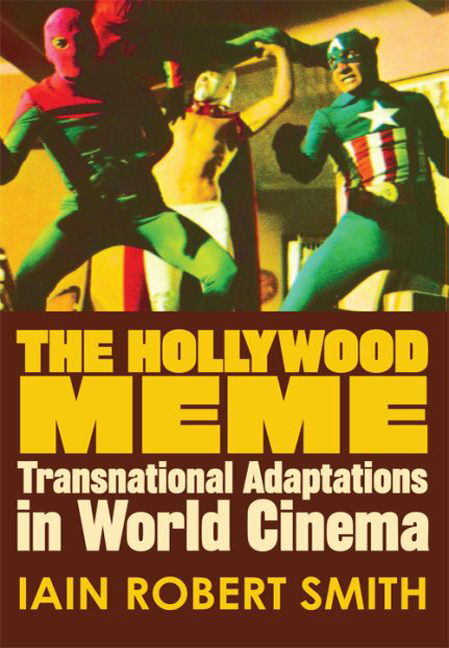Book contents
- Frontmatter
- Contents
- List of Figures
- Acknowledgements
- Introduction
- 1 Tracing the Hollywood Meme: Towards a Comparative Model of Transnational Adaptation
- 2 Hollywood and the Popular Cinema of Turkey
- 3 Hollywood and the Popular Cinema of the Philippines
- 4 Hollywood and the Popular Cinema of India
- Conclusion: Reflections on the Hollywood Meme
- Bibliography
- Index
1 - Tracing the Hollywood Meme: Towards a Comparative Model of Transnational Adaptation
Published online by Cambridge University Press: 26 April 2017
- Frontmatter
- Contents
- List of Figures
- Acknowledgements
- Introduction
- 1 Tracing the Hollywood Meme: Towards a Comparative Model of Transnational Adaptation
- 2 Hollywood and the Popular Cinema of Turkey
- 3 Hollywood and the Popular Cinema of the Philippines
- 4 Hollywood and the Popular Cinema of India
- Conclusion: Reflections on the Hollywood Meme
- Bibliography
- Index
Summary
Eclecticism is the degree zero of contemporary general culture: one listens to reggae, watches a western, eats McDonald's food for lunch and local cuisine for dinner, wears Paris perfume in Tokyo and ‘retro’ clothes in Hong Kong …
Jean-François Lyotard (1984: 76)Motion pictures are the most conspicuous of all the American exports. They do not lose their identity. They betray their nationality and their country of origin. They are easily recognised. They are all pervasive. They colour the minds of those who see them. They are demonstrably the greatest single factors in the Americanization of the world and as such may fairly be called the most important and significant of America's exported products.
Motion Picture Producers & Distributors of America (quoted in Vasey, 1997 43)Rambo had conquered Asia. In China, a million people raced to see First Blood within ten days of its Beijing opening, and black marketers were hawking tickets at seven times the official price. In India, five separate remakes of the American hit went instantly into production, one of them recasting the macho superman as a sariclad woman. In Thailand, fifteen-foot cutouts of the avenging demon towered over the lobbies of some of the ten Bangkok cinemas in which the movie was playing, training their machine guns on all who passed. And in Indonesia, the Rambo Amusement Arcade was going great guns, while vendors along the streets offered posters of no one but the nation's three leading deities: President Suharto, Siva and Stallone.
Pico Iyer (1988: 3)In his travelogue Video Night in Kathmandu: And Other Reports from the Not-So-Far East, novelist and essayist Pico Iyer describes such diverse cultural phenomena as mohawk haircuts in Bali, lounge singers in the Philippines and Rambo-inspired musicals made in India. Setting off to explore the impact of American popular culture within Asia, the book tells the story of how Iyer gradually came to find that, ‘as I left the realm of abstract labels and generalised forces, and came down to individuals … the easy contrasts began to grow confused’ (1988: 21).
- Type
- Chapter
- Information
- The Hollywood MemeTransnational Adaptations in World Cinema, pp. 12 - 33Publisher: Edinburgh University PressPrint publication year: 2017



